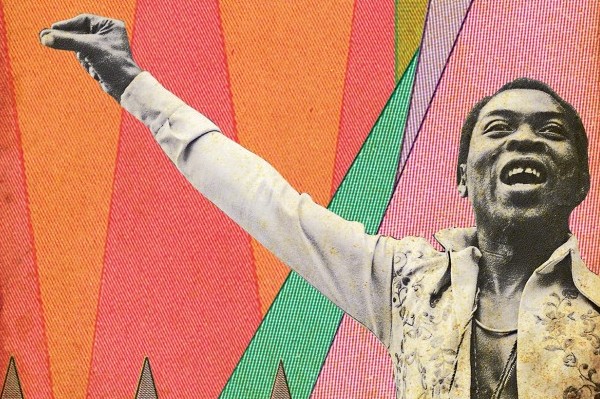In the months leading up to his death, Fela Kuti did an interview with Keziah Jones. He said a lot of crazy things: Europe is technologically advanced because Mungo Park stole a pot containing secrets of technology from Ile Ife; the moon-landing is a hoax; UFOs fly past his window every night. He also said that on January 25, 1981, he was possessed by a spirit. This post is about something Fela saw during this mystical experience.
Here is the excerpt from the interview:
So what did Jesus Christ come to take? Sins or scenes?
Human beings have their own scenes, their own films (in their minds).
I saw this when I was possessed by a spirit back in January 25, 1981.
But some people can take your film off you when you are being “educated.”
So now, the reason why democracy and politics isn’t suffice today is because human beings have lost their S.C.E.N.E.S.
[Laughs.]
Ha! Look, there is no evening I don’t see a UFO pass this window.
No sound at all, just light going past—schwoom!!
When you come from the spirit world with this knowledge and you start to give your own meaning and “film” of life, somebody will take it off you, take you to school starting from your parents for that matter!
— Fela Kuti,
Interview with Keziah Jones, 1996,
By “film of life,” Fela does not simply mean a movie. He is not simply advocating that we make more movies about Africa, even though that’s something Fela would have liked. A deeper philosophical question is at stake in Fela’s metaphor of life as film.
Fela begins with the assumption that what we know and see of the world is framed by certain regimes of power—mass media, science, capitalism, international political orders, and so on. What we imagine to be reality is a set of heavily curated images stitched and framed and passed off as the truth of our world. The life we think we are living is actually happening on the other side of the screen, and we are not the actors. We are spectators passively looking on and seeing only what the system wants us to see. “So when you are “watching” that film,” Fela explains, “it means that you are passing your energy into that film—passing it to those who already know the path that your thoughts could take.” This is why education was, for Fela, one of the biggest hoax of our modern world. Education is an instrument for taking away our “scenes.” How? Education does not enlighten—make us see better— but instead programs us to imagine the world through pre-made framework of thought.
To counter this world of doctored images designed to predict and control “the path that your thoughts could take,” Fela introduces something he calls “the film of life” made up of our own “S.C.E.N.E.S.” By “scene,” Fela means a rare glimpse of the world as it exists outside the frame of reference of science or world history. Fela’s “scene” is an unfiltered version of life. Accessing or creating our own “scenes” in our own minds is, for Fela, a technique of seeing that reveals life in its true form.
What is revealed can be strange. Nietzsche, for instance, saw terrible things. Fela saw UFOs flying past his window. Nietzsche saw his own scenes in fits of madness, Fela in an intense moment of mystical possession. It may well be that, at the limit of science or world history, there is a UFO flying past or an infernal abyss, but there is also the possibility of creating new ways of seeing the world, new language for speaking about our world, a host of new metaphors, images, concepts for making life comprehensible.
Fela called it seeing UFOs fly past his window. We could also just think of it as reassembling a new archive of fragmented images positioned obliquely to those grand images seeking to control our sense of the world. These broken bits of images, slanted and stitched together into a montage is another way to understand what Fela means by “S.C.E.N.E.S.” The “film of life” is what happens when these “scenes” intersect “at a thousand different angles, setting up vibrations across the epochs of…history.”
The surrealists have something in common with Fela. They thought a lot about limit experiences like dreams. Surrealists, among other things, believe there’s some kind of artistic and philosophical power in the unpredictability and fragmentation of dream-images.
Fela’s “film of life” is a kind of lived surrealism. The few who, like Fela, can stand the fiery intensity of such a vision are the army of mad philosophers and artists responsible for reinventing our world.
*************
Video via gdb_projects (creative common license)
Post image: “Fela Collage” by Lexx Digs









Fela Anikulapo Kuti: Musician, Activist, and Politician – Multiple Modernities October 17, 2020 15:34
[…] Schwooming UFOs — A Fela Kuti Theory of Images […]